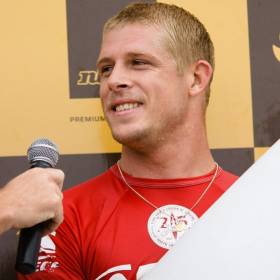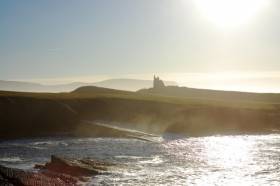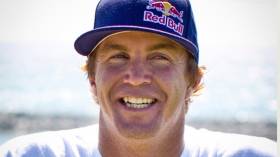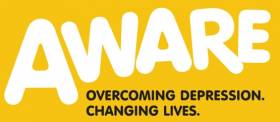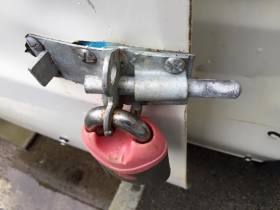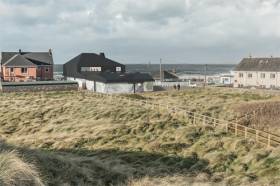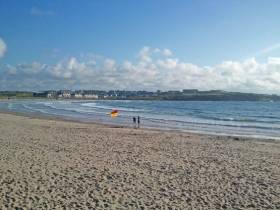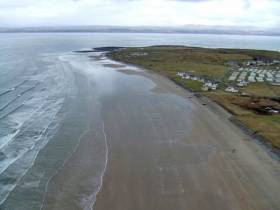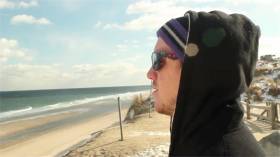Displaying items by tag: Surfing
Shark Attack Surfer Returns To Claim Victory In Same Waters
#Surfing - A year after his close call with a shark off South Africa, Irish-Australian surfing pro Mick Fanning rode the waves to victory this week at the scene of the attack.
As the Guardian reports, Fanning topped the field at the World Surfing League event at Jeffreys Bay in South Africa's Eastern Cape, where almost exactly a year ago he was knocked off his board by a shark during a contest.
Video of that incident quickly went viral online, and Fanning himself said it was a "miracle" he wasn't injured in the altercation.
Yet within days he'd already vowed to not only get back on his board - but return to the spot where his life hung in the balance.
“I’m just stoked that I actually got to come back and right the wrong," he says, "that was my whole plan, was to just to right to wrongs that happened last year. And we did that now, so we can move on.”
The Guardian has much more on the story HERE.
Mullaghmore Surfing Photo In The Running For Big Wave Award
#Surfing - A stunning photograph of Cornish surfer Tom Butler riding the swell at Mullaghmore Head was up for a top prize at the Nomad Big Wave Awards in Los Angeles this week.
The image of Butler – no stranger to Ireland's big wave scene – beneath a cresting wave netted a 'Best Shot of a Surfer in a Barrel' nomination for Irish-based South African photographer Ian Mitchinson at the inaugural awards, as the Cornish Guardian reports.
But Butler was "stoked" enough to see his spectacular shot make the front page of Monday's Irish Times, which reports on another big nomination for the Sligo swell as South African surfer Frank Solomon's attempt, filmed by Irish man Peter Clyne, is up for the 'Ride of the Year' gong.
The full list of award winners will be announced later today.
Freesurfer Jamie O'Brien Sings Praises Of Ireland's Waves
#Surfing - American surfing pro Jamie O'Brien sings the praises of Clare's big waves as part of his latest web series on chasing the world's best surf.
Speaking with entertainment.ie ahead of the fifth season of his RedBull.tv show Who is JOB, O'Brien hailed the "world class" waves at Lahinch, despite the cold and the unpredictable weather this spring is bringing us.
But O'Brien – a pioneer of the concept of 'freesurfing' – was equally impressed with the "hardcore" dedication of local youngsters to what's still an emerging sport in Ireland.
"You gotta be hardcore to go surfing in that cold water," he said.
Another boarder who's been exploring Ireland's surfing scene is Andrew 'Cotty' Cotton, the star of his own Red Bull web series that started this month with his first stop along the Wild Atlantic Way in North Donegal.
#Surfing - Surfers from across the North West paired up to take part in a unique event to raise money for mental health charity Aware NI last week.
The money raised at the tandem surfing competition, run by Portrush-based surfing school Troggs, will help Award NI provide vital services for people affected by depression across Northern Ireland.
Teams of surfers took to Portrush East Strand on Sunday 20 March to perform tricks and manoeuvres in pairs in an attempt to impress the experienced judges.
The tandem surfing competition, the first of its kind in Northern Ireland, raised over £300 (€372) for Aware NI.
The event was the brainchild of Carl Russell, owner of Troggs Surf School, after some of his own clients recommended the benefits of surfers in overcoming the own depression.
“The idea came about from my brother Jamie Russell and I realising that we could experience surfing together on the same board when surf conditions weren’t favourable for our shortboards,” he said.
“We ended up having as much fun if not more tandem surfing as we did surfing normally. Then the link for the competition was made to show that the proven research that surfing helps depression is a real tool that can be used."
Russell explained that surfing "has had positive effect on people and clients of ours with mental health issues which is why we have chosen this charity, plus this professional organisation really helps people.
"We run custom surf programmes for groups affected by the issues mentioned. Our event is due to run again September-October 2016 and will be even bigger.
“Thanks to all our sponsors gregwallace.co.uk, garymccall.co.uk, couconoutdoor.com, Brew Note Portrush & AC Electronics Coleraine.
Only last year the French seaside town of Biarritz become the first in the world to prescribe surfing lessons as a way to treat depression to heart disease.
Some 20 doctors are taking part in a pilot scheme in Europe’s surf capital to encourage the notoriously pill-popping French to cut back on medication and take to the waves.
“Aware fully endorse the message that physical exercise cannot only improve your physical health but also your mental health,” said Kieran Hughes, fundraising officer at Aware NI.
“The benefits of physical exercise for mental health are widely recognised and surfing is one of the best examples of that. Participants are getting excellent exercise but also getting out in the open and close to nature which can only be a positive thing.
“We would like to sincerely thank Carl and everyone at Troggs Surf School for raising money for Aware. All the money raised will go towards Aware’s Support Services and education programmes to help people affected by depression across Northern Ireland.”
Burglary At Lahinch Surfing School
#Surfing - Lahinch Surf Experience has asked the public to be on the lookout for a number of items stolen from a van outside the surfing school's premises overnight.
According to a Facebook post this morning (Saturday 26 March), some 40 pairs of Alder Edge boots and around 10 O'Neill wetsuits were taken in the burglary.
The business is asking anyone who might be offered any of these items for sale to contact them or Ennistymon Garda Station.
The news comes just hours after the Shielbaggan Outdoor Centre saw the return of a trailer full of kayaks that had been stolen from its premises in Ramsgrange, Co Wexford earlier this week.
Bold Design For New Strandhill Surfing Centre
#Surfing - A black rubber roof is one of the unusual features of the winning design for a new maritime centre in Strandhill, as the Sligo Champion reports.
The vision for the new surfing and coastal community centre by London architects Manalo & White also includes large concrete panels around the perimeter with Celtic seascapes and surfing scenes by Barry Britton, whose known as much for his art as for his waveriding legacy – not least being father of women's surfing pioneer Easkey Britton.
A planning application is expected to be completed by the end of April with a view to having the €500,000 facility, which would replace the existing centre used by the local surf club and other groups, ready in time for next year's tourism season.
The Sligo Champion has more on the story HERE.
Charity Tandem Surf In Portrush This Sunday
#Surfing - Sign-ups are still welcome for a charity tandem surfing competition in Portrush this coming weekend, as the Coleraine Times reports.
Waveriders will be lining up two-by-two on the East Strand this Sunday 20 March for the charity event in aid of Aware NI, the only mental health charity in Northern Ireland focusing on depression and bipolar disorder.
It's one of a number of events over St Patrick's Weekend in aid of mental health support, with Aware in the Republic hosting its annual Harbour2Harbour walk around Dublin Bay this Thursday 17 March.
Similar walks will be taking place on St Patrick's Day morning at Cork Harbour (details) and at Salthill in Galway (more here).
Donegal Surf School Turns To Peer Funding For Expansion
#Surfing - A Donegal surfing school has raised €20,000 for its expansion via peer-to-peer lending, as Donegal Now reports.
Fin McCool Surf School in Rossnowlagh aims to complete renovations of its new base in the town thanks to funds raised via Irish 'crowdlending' providers Linked Finance.
"Growing demand means it’s now time for us to invest further into our facilities and we’re delighted to be partnering with Linked Finance to refurbish our new premises," said owner Neil Britton, cousin of Irish women's surfing pioneer Easkey Britton.
Donegal Now has more on the story HERE.
World Premiere For Surfing Documentary In Dingle Next Weekend
#Surfing - A new documentary following two American descendants of the 'King of the Blaskets' as they surf the waves of their ancestral homeland will have its world premiere in Dingle next weekend.
The Crest will be screened as part of an eclectic programme at the Dingle International Film Festival at 6pm on Saturday 19 March at the Blasket Centre (Ionad an Bhlascaoid Mhóir), and again on Sunday 20 March at 2pm in the Phoenix Cinema.
Directed by Mark Covino, whose last film was the award-winning music documentary A Band Called Death, The Crest follows the exploits of cousins Andrew Jacob and Dennis 'DK' Kane as they trace their shared ancestry back to the Blasket Islands.
A rare stronghold of traditional Irish culture over the centuries, the rocky island chain is where their great great grandfather once presided as 'An Rí' - the king of the islands.
One of his responsibilities to the isolated community was to row the treacherous Atlantic seas to the mainland on the Dingle Peninsula for supplies.
His was a seaworthiness that seems to have carried on through the generations, as both Jacob and Kane are surfing enthusiasts to the professional level.
It's only natural, then, that they would explore their bloodline by putting themselves in their regal ancestor's shoes – or rather waters.
See the trailer for The Crest below:
NI Radio Host Tells Of 'Near-Death' Surfing Experience
#Surfing - He broke his neck in a horror surfing accident in the summer of 2014.
But Mark Patterson was back at work within two months of his ordeal – and back on his board not long after.
Speaking to the Belfast Telegraph after his "year of extremes", the popular Northern Ireland radio presenter recalls how one bad move could have cost him his life.
A long-time, well-travelled wave chaser, Patterson was surfing in the Basque Country after making a Radio 4 documentary on the story when he dove off the crest of a wave into what he thought was deep water - but instead hit the sea floor just a foot below the surface "like a javelin".
It brings to mind the accident that paralysed Trinity student Jack Kavanagh on a surfing holiday in Portugal in 2012, as previously reported on Afloat.ie.
Despite going numb through much of his body, amazingly Patterson was able to crawl back onto the beach and even pick up his surfboard.
His condition was serious: a fracture to his C6 vertebra that meant a full neck cast and months of rehab at Belfast's Royal Victoria Hospital.
But in a matter of months, Patterson went from that low to a lifetime high when he beat NI broadcasting kingpin Stephen Nolan to the 2015 Speech Broadcaster of the Year prize in the annual NI Awards.
The Belfast Telegraph has much more on the story HERE.
In other news from the waves, female surfing pioneer Easkey Britton tells the Irish Independent about what drives her love of the surf – and about the sporting women who inspire her.


























